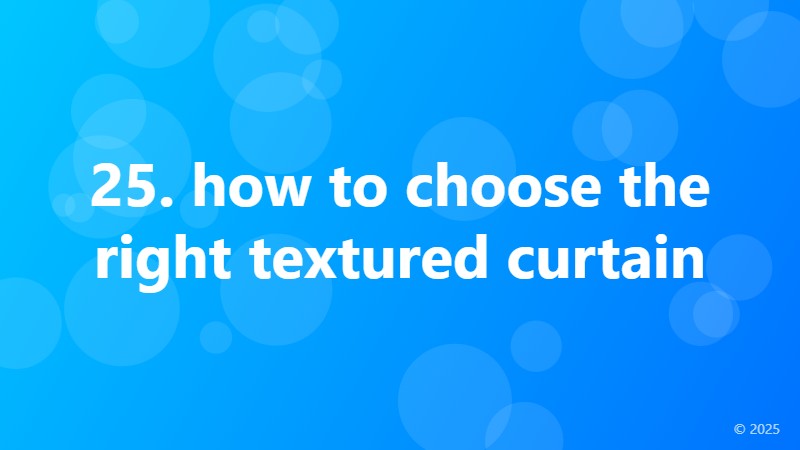25. how to choose the right textured curtain

Understanding the Importance of Textured Curtains
When it comes to decorating your home, curtains are an essential element that can elevate the overall aesthetic and ambiance of a room. Among the various types of curtains available, textured curtains have gained popularity in recent years due to their unique visual appeal and functional benefits. With so many options available, choosing the right textured curtain can be overwhelming. In this article, we will guide you through the process of selecting the perfect textured curtain for your space.
Consider the Room's Purpose and Style
Before selecting a textured curtain, it's essential to consider the room's purpose and style. For instance, if you're looking for a curtain for a bedroom, you may want to opt for a softer, more subtle texture that promotes relaxation. On the other hand, a living room or office may require a more durable and stylish textured curtain that adds a touch of sophistication.
Additionally, think about the overall style of your room. Do you prefer modern, contemporary, or traditional decor? This will help you narrow down your options and choose a textured curtain that complements your existing furniture and decor.
Choose the Right Material
The material of your textured curtain is crucial in determining its overall look and feel. Some popular materials for textured curtains include:
Linen: Known for its natural, earthy texture and breathability, linen is an excellent choice for rooms that require a relaxed, casual atmosphere.
Cotton: A popular choice for textured curtains, cotton offers a soft, gentle texture that works well in traditional and modern settings.
Velvet: For a luxurious, sophisticated look, velvet is an excellent option. Its soft, plush pile adds depth and texture to any room.
Faux silk: A cost-effective alternative to real silk, faux silk offers a smooth, lustrous texture that adds elegance to any room.
Pattern and Color Considerations
The pattern and color of your textured curtain can greatly impact the overall aesthetic of your room. Here are some tips to consider:
Patterns: Textured curtains with subtle patterns, such as a gentle herringbone or a soft geometric design, can add visual interest to a room. Avoid bold, busy patterns that may overwhelm the space.
Colors: Choose a color that complements your existing furniture and decor. Neutral shades like beige, gray, and taupe work well in most settings, while bolder colors can add a pop of personality to a room.
Functional Considerations
In addition to aesthetics, it's essential to consider the functional aspects of your textured curtain. Here are some key factors to think about:
Blackout: If you're looking to block out light, choose a textured curtain with blackout lining or a thick, heavy material that can effectively reduce light transmission.
Insulation: Textured curtains can help regulate temperature and reduce noise pollution. Look for materials with insulating properties, such as thermal or acoustic insulation.
Maintenance: Consider the maintenance requirements of your textured curtain. Some materials, like velvet, may require dry cleaning, while others, like cotton, can be machine washed and dried.
Conclusion
Choosing the right textured curtain can be a daunting task, but by considering the room's purpose and style, material, pattern, and color, as well as functional aspects, you can find the perfect curtain that meets your needs and elevates your space. Remember to prioritize your requirements, and don't be afraid to experiment with different materials, patterns, and colors until you find the perfect textured curtain for your home.